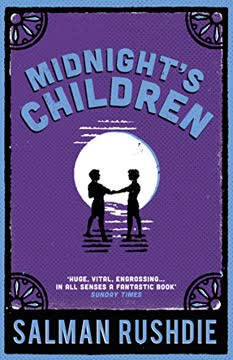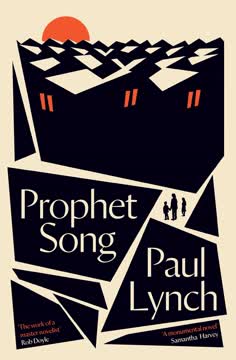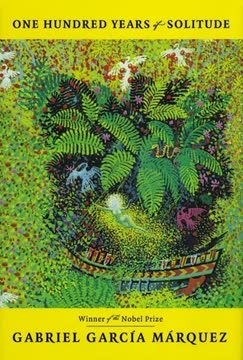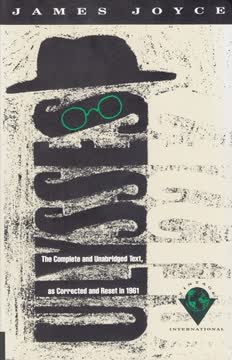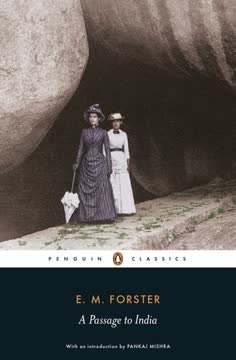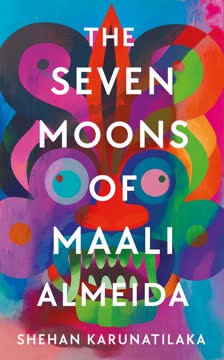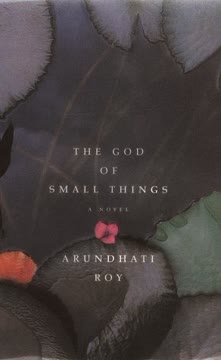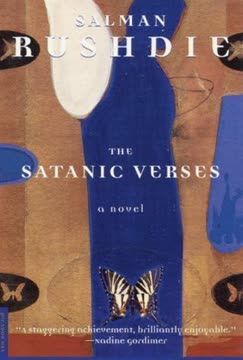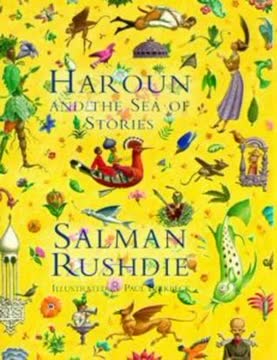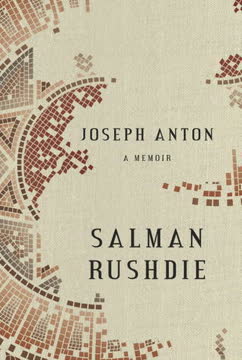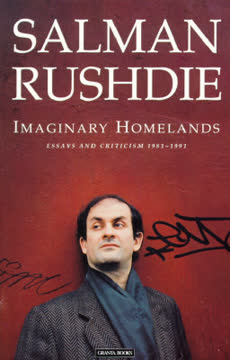Plot Summary
The Perforated Sheet Unveiled
In the early 20th century, in Kashmir, Dr. Aadam Aziz's life is forever altered by a moment of doubt and a nose bloodied in prayer. This moment creates a "hole" in his faith and self, making him vulnerable to the tides of history and the power of women. His destiny is entwined with a mysterious perforated sheet, through which he first glimpses his future wife, Naseem. Their love, filtered through tradition and secrecy, sets the stage for generations to come. The sheet, with its literal and symbolic holes, becomes a talisman and curse, marking the beginning of a family saga where private lives are inextricably linked to the fate of a nation.
Destiny's Children Are Born
On the stroke of midnight, August 15, 1947, as India gains independence, Saleem Sinai is born in Bombay, his life mystically bound to the newborn nation. Swapped at birth by the ayah Mary Pereira, Saleem's identity is a secret, his fate "handcuffed to history." He is not alone: hundreds of children are born in that hour, each with a unique gift, their lives echoing the promise and peril of India's independence. Saleem's family, marked by migration, ambition, and loss, becomes a microcosm of the subcontinent's tumult, as the personal and political are forever fused.
The Chained Nose of History
Saleem inherits his grandfather's prodigious nose, a symbol of both blessing and curse. This nose, sensitive beyond measure, becomes his conduit to the world's secrets and sorrows. Through it, Saleem discovers his telepathic powers, connecting him to the other "midnight's children." The nose is also a marker of difference, a source of ridicule and pride, and a reminder that the body itself is a battleground for history's whims. Saleem's sense of smell becomes a metaphor for memory, intuition, and the inescapable pull of ancestry.
Love, Loss, and Partition
The Sinai family's fortunes rise and fall with the tides of Indian history. The trauma of Partition, the violence and migrations, are mirrored in personal betrayals, forbidden loves, and the shattering of old certainties. Saleem's mother, Amina, and his ayah, Mary, embody the contradictions of love and duty, while Saleem's own identity is fractured by secrets and swaps. The family's journey from Kashmir to Agra to Bombay is a search for belonging in a world remade by violence and hope, where every gain is shadowed by loss.
The Game of Snakes and Ladders
Saleem's childhood is a game of snakes and ladders, where every ascent is matched by a fall. The family's fortunes are buffeted by political upheaval, personal rivalries, and the unpredictable turns of history. Saleem's telepathic connection to the other midnight's children becomes both a blessing and a burden, as their powers and differences threaten to tear them apart. The game is a metaphor for India itself, a land of dizzying possibility and sudden reversals, where the only certainty is uncertainty.
The Midnight Conference
As Saleem matures, he gathers the other midnight's children in a secret "conference" of minds. Each child, born in the first hour of independence, possesses a unique gift—telepathy, transformation, prophecy, and more. Together, they represent the hope of a new India, but also its divisions: language, class, religion, and ambition. Saleem's dream of unity is undermined by rivalry, especially with Shiva, his changeling counterpart. The conference becomes a battleground for the soul of the nation, as the children's powers mirror the country's fractured identity.
Exile and the Loss of Magic
Saleem's life is upended by exile—first to Pakistan, then to the Sundarbans jungle, and finally to the margins of society. The loss of his telepathic powers is a metaphor for the loss of innocence, connection, and hope. In the jungle, Saleem and his companions are stripped of memory and self, reduced to survival. The magic of midnight's children fades, replaced by the harsh realities of war, betrayal, and the relentless march of time. Exile is both a punishment and a crucible, forging a new, humbler self.
The Return to Bombay
Saleem's return to Bombay is bittersweet. The city of his childhood is transformed, its landmarks erased or altered, its people changed by time and loss. Saleem is reunited with Mary Pereira, now a successful pickle magnate, and with his son, Aadam, whose silent wisdom hints at a new generation's potential. The past is both a comfort and a burden, as Saleem struggles to reconcile memory with reality. The city, like Saleem himself, is a palimpsest of histories, loves, and betrayals.
The Emergency Descends
The declaration of Emergency by Prime Minister Indira Gandhi marks the darkest chapter in Saleem's life and in the nation's history. Civil liberties are suspended, dissent is crushed, and the midnight's children are hunted down as threats to the state. Saleem is betrayed, imprisoned, and subjected to the ultimate violation: sterilization, the literal and symbolic end of hope. The Emergency is a time of fear, silence, and the erasure of individuality, as the dreams of independence are trampled by the machinery of power.
The Widow's Hand
The Widow—Indira Gandhi—becomes the embodiment of state violence and paranoia. Her agents, including the traitorous Shiva, round up the midnight's children, subjecting them to torture and sterilization. Saleem, once the "mirror of the nation," is reduced to a broken, childless man, his powers and dreams excised. The Widow's Hand is both a person and a symbol, the force that snips away possibility, love, and rebellion. Yet even in defeat, Saleem clings to memory, refusing to let the past be erased.
The Magicians' Ghetto
In the aftermath of the Emergency, Saleem finds refuge among Delhi's magicians, a community of illusionists, snake-charmers, and outcasts. Here, he marries Parvati-the-witch, whose powers and love offer a brief respite from despair. Their son, Aadam, is born at midnight, his ears as large as Saleem's nose, a new vessel for the nation's hopes and traumas. The ghetto is a place of survival and reinvention, where the powerless create their own forms of resistance and meaning.
The Birth of Aadam Sinai
On the night of the Emergency, as India is plunged into darkness, Aadam Sinai is born. His birth is both a repetition and a renewal, a sign that history's cycles continue. Aadam's silence and listening ears suggest a new kind of magic, one that absorbs and endures rather than commands. Saleem, now a father, is both proud and fearful, knowing that his son's fate will be as tangled with the nation's as his own. The birth is a moment of hope amid ruin, a reminder that the future is always being born.
The End of Hope
The Widow's campaign of sterilization reaches its climax in the Widows' Hostel, where Saleem and the surviving midnight's children are rendered infertile, their powers drained. The operation is both physical and metaphysical, the final act of a regime determined to erase the possibility of change. Saleem's sense of self is shattered, his connection to the other children severed. Yet even in this nadir, the memory of magic persists, a stubborn refusal to let the past be wholly destroyed.
The Pickling of Memory
In the final chapters, Saleem becomes a maker of pickles, working with Mary Pereira in her factory. The act of pickling becomes a metaphor for memory, storytelling, and survival. Each jar contains a chapter of his life, a blend of sweetness, bitterness, and spice. Saleem's autobiography is an act of resistance against forgetting, an attempt to give shape and meaning to chaos. The pickles are his legacy, his gift to his silent son and to the nation that has both made and unmade him.
The Crowd and the Cracks
As Saleem approaches his thirty-first birthday, he feels himself cracking, his body and story breaking under the weight of history. In a vision, he is trampled by the crowd, reduced to "six hundred million specks of dust." The individual is swallowed by the nation, the private by the public, the self by the multitude. Yet in this dissolution, there is also a kind of transcendence, a recognition that every life is part of a larger, unfinished story.
The Last Jar Remains
Saleem's final act is to prepare one last, empty pickle jar, a space for the future that cannot be preserved or predicted. The past has been pickled, the present endured, but the future remains open, uncertain, and full of possibility. Saleem's story ends not with closure, but with an invitation to imagine what comes next, to fill the empty jar with new memories, new lives, new midnights.
Abracadabra and the Future
In the closing pages, Saleem's son Aadam speaks his first word: "Abracadabra." The word is both a joke and a promise, a sign that magic, memory, and hope persist even after the worst has happened. Saleem, broken but unbowed, prepares for his own end, comforted by the thought that stories, like pickles, can outlast their makers. The future belongs to the children, to the crowd, to the next midnight. The story ends, but the magic goes on.
Characters
Saleem Sinai
Saleem is the protagonist and narrator, born at the exact moment of India's independence. His life is a tapestry of personal and national history, marked by magical powers, family secrets, and the burden of being "handcuffed to history." Saleem's telepathy connects him to the other midnight's children, making him both a leader and a victim. His sense of self is fractured by exile, loss, and betrayal, yet he remains determined to find meaning in chaos. Saleem's journey is one of transformation—from child to exile, from telepath to pickle-maker, from individual to symbol. His psychological complexity lies in his longing for love, belonging, and purpose, and in his ultimate acceptance of the cracks and failures that define every life.
Shiva
Shiva is Saleem's dark twin, born at the same midnight but swapped at birth. Gifted with immense physical power and deadly knees, Shiva embodies violence, ambition, and the darker side of the nation's promise. His life is a mirror-image of Saleem's: where Saleem seeks connection, Shiva seeks domination; where Saleem is introspective, Shiva is action-driven. Shiva's resentment at being denied his birthright fuels his betrayal of the midnight's children and his collaboration with the Widow's regime. Yet he is also a tragic figure, shaped by poverty, rejection, and the inescapable logic of history. Shiva's legacy is a generation of illegitimate children, a symbol of both destruction and renewal.
Parvati-the-witch (Laylah Sinai)
Parvati is one of the midnight's children, gifted with real magical powers. Her love for Saleem is steadfast, even as he is haunted by the ghost of his sister. Parvati's resilience and resourcefulness are evident in her survival, her ability to conjure and heal, and her determination to have a child. Her marriage to Saleem is both a union of magic and memory and a site of pain and misunderstanding. Parvati's death during the Emergency is a devastating loss, but her legacy lives on in her son, Aadam, and in the stubborn hope she represents.
Amina Sinai (Mumtaz Aziz)
Amina is Saleem's mother, a woman who changes her name and identity in pursuit of love and security. Her life is marked by sacrifice, guilt, and the struggle to reconcile tradition with modernity. Amina's relationships—with her husbands, her children, and her own past—are fraught with longing and regret. She is both nurturing and haunted, a figure of strength and vulnerability. Her psychological depth lies in her capacity for love, her endurance in the face of loss, and her ultimate acceptance of the impossibility of controlling fate.
Mary Pereira
Mary is the servant who swaps Saleem and Shiva at birth, setting the entire saga in motion. Her act is driven by love, guilt, and a desire to give her lover's child a better life. Mary's devotion to Saleem is unwavering, and her later success as a pickle magnate is both ironic and redemptive. She embodies the themes of nurture, betrayal, and the blurred lines between right and wrong. Mary's psychological complexity is rooted in her capacity for both great harm and great care, and in her ultimate quest for forgiveness and belonging.
Aadam Aziz
Saleem's grandfather, Aadam, is a doctor whose loss of faith and encounter with the perforated sheet set the family's story in motion. His life is a struggle between reason and superstition, tradition and change. Aadam's relationships—with his wife, his children, and his own beliefs—are marked by doubt, longing, and the search for meaning. His psychological depth lies in his vulnerability to women and history, and in his ultimate acceptance of ambiguity and loss.
The Widow (Indira Gandhi)
The Widow is both a historical figure and a symbol of state power, paranoia, and violence. Her regime's Emergency is the novel's darkest chapter, marked by the suspension of freedom, the sterilization of the midnight's children, and the crushing of hope. The Widow's psychological complexity lies in her need for control, her fear of rivals, and her willingness to sacrifice anything for power. She is both a mother to the nation and its greatest betrayer, embodying the dangers of unchecked authority.
Jamila Singer (The Brass Monkey)
Saleem's sister, Jamila, transforms from the mischievous Brass Monkey into Pakistan's national singer. Her voice is a source of pride and longing, her life a mirror of the subcontinent's divisions. Jamila's relationship with Saleem is fraught with love, rivalry, and the unspoken pain of separation. Her psychological depth lies in her ability to reinvent herself, to endure loss, and to embody both the promise and the limitations of art and nationhood.
Picture Singh
The Most Charming Man in the World, Picture Singh is a snake-charmer and Saleem's last surrogate father. His wisdom, resilience, and generosity offer Saleem a model of survival and dignity amid poverty and loss. Picture Singh's decline mirrors the fading of magic and hope in the nation, but his presence is a reminder of the enduring power of community, memory, and love.
Padma
Padma is Saleem's companion, audience, and eventual fiancée. Her earthiness, skepticism, and practicality ground Saleem's flights of memory and fantasy. Padma's longing for marriage, stability, and a future is a counterpoint to Saleem's obsession with the past. Her psychological depth lies in her capacity for love, her resilience in the face of disappointment, and her insistence on the possibility of new beginnings.
Plot Devices
Magical Realism and the Chutnification of History
Midnight's Children is structured around the device of magical realism, where the extraordinary is woven seamlessly into the fabric of everyday life. Saleem's telepathy, the powers of the midnight's children, and the recurring motifs of noses, knees, and perforated sheets are not mere fantasy, but metaphors for the complexity of Indian identity and history. The act of pickling—preserving the past in jars of memory and spice—serves as both a narrative structure and a philosophical stance, allowing the novel to embrace contradiction, ambiguity, and the impossibility of a single, authoritative truth. The story is told in fragments, digressions, and repetitions, mirroring the chaos and richness of the subcontinent itself. Foreshadowing is used throughout, as Saleem's narrative voice constantly hints at future events, creating a sense of inevitability and fatalism. The novel's structure is circular, with beginnings and endings echoing each other, and with the future always left open, an empty jar waiting to be filled.
Analysis
Midnight's Children is a monumental exploration of the intertwined destinies of individuals and nations, using the tools of magical realism to capture the chaos, beauty, and tragedy of postcolonial India. Salman Rushdie's novel is both a personal memoir and a national epic, a story of family, love, betrayal, and survival that mirrors the birth and growing pains of a country. The central lesson is that history is not a single, authoritative narrative, but a collage of memories, myths, and dreams, each as real and unreliable as the next. The novel warns against the dangers of power, the seductions of certainty, and the erasure of individuality in the name of progress or unity. Yet it also celebrates resilience, the stubborn persistence of hope, and the possibility of renewal even after the worst has happened. Saleem's journey—from privileged child to exile, from telepathic leader to broken survivor, from individual to "six hundred million specks of dust"—is both a cautionary tale and a testament to the enduring power of storytelling. In the end, Midnight's Children invites us to embrace the cracks, the contradictions, and the unfinished stories that make us who we are, and to find meaning not in perfection, but in the act of remembering, preserving, and passing on our tales.
Last updated:
Review Summary
Midnight's Children is widely praised as a masterpiece of magical realism and historical fiction. Readers appreciate Rushdie's intricate storytelling, lyrical prose, and allegorical portrayal of India's history through the life of Saleem Sinai. The novel's ambitious scope, blending of fantasy and reality, and exploration of identity and nationalism resonate strongly with many. While some find the narrative style challenging, most agree it's a profound and rewarding read that deserves its critical acclaim and numerous awards.
Similar Books
Download PDF
Download EPUB
.epub digital book format is ideal for reading ebooks on phones, tablets, and e-readers.
